by Mike Telin & Daniel Hathaway
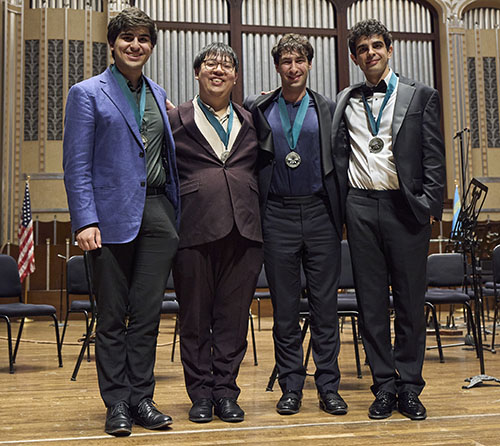
“It’s amazing. Honestly, when I came to the competition I had zero expectations for what was going to happen.” — Maxim Lando (21, USA), third prize.
“It feels really great.” — Evren Ozel (25, USA), second prize.
“It’s a dream come true.” — James (Zijian) Wei (25, China), first prize.
On Sunday afternoon following the concerto round with The Cleveland Orchestra on Friday and Saturday, we had the opportunity to meet with the four finalists in the atrium of the Cleveland Museum of Art to get their impressions about the innovations in this year’s Cleveland International Piano Competition, which is celebrating its 50th anniversary, and how it felt to be a prizewinner.
In an interview with this publication, Piano Cleveland president Yaron Kohlberg said that “A lot has changed in the classical music world during the past 50 years,” and that this year’s competition is all about creating more and better ways for it to serve the contestants, and the audience.
In that same interview, CIPC executive director Marissa Moore noted that the changes — like the opening ceremony featuring popular transcriptions for two pianos — are designed to encourage contestants to step out of their comfort zone. “I think what is the most exciting about this year’s competition is that we have given the contestants so much freedom.”
During our conversations, the atrium was abuzz with visitors and busy with workers and caterers setting up beautifully decorated tables for Piano Cleveland’s gala which would take place that evening.
With an application deadline of December 2023, and First Rounds held the following March in Paris and Cleveland, by the conclusion of the competition on August 11 the final four had spent nearly a year focusing on CIPC 2024.
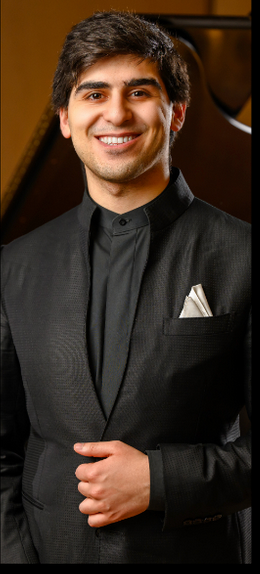
Maxim Lando said that what struck him is that Kohlberg and Moore are completely flipping the switch for competitions. “They’re making everything not only more accessible but more lively and more fun. I think it’s completely breaking down the barriers of what people think a piano competition is all about.”
“Very often it happens in competitions that one gets to play only the first round,” Giuseppe Guarrera said. “It’s very disappointing because the rest of the repertoire is well prepared and nobody will hear it. So the fact that one has the possibility of playing the whole repertoire prepared, is in itself a nice prize.”
I have never felt so welcomed,” James (Zijian) Wei said. “It was very nice to be part of something bigger than yourself. I only knew a few of the other pianists before I came to Cleveland, but the relaxed atmosphere allowed me to make many friends.”
“One thing that I found amazing was that we each had our own practice room. It even had my name on it,” Ozel said. “We stayed in the Case dorms and all of the rounds took place at Severance and at the Glidden House, so everything was within walking distance and that was really convenient.”
“I just embraced everything and I love that we had the opportunity to branch out and do different things,” Lando said. “With the Concert Truck we were able to show a different side of our programming for a widespread public audience in downtown Cleveland at Playhouse Square And then for the baseball game — which was my first — you got a completely different kind of thrilling experience. And for the two-piano opening ceremony, playing pop songs with your partner was a highlight. I loved every single step of the way.”
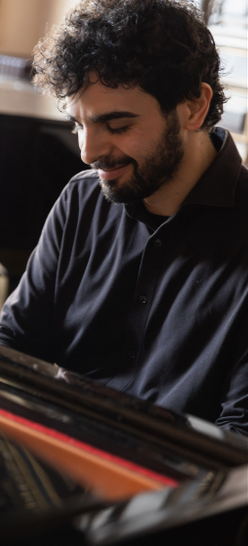
“I was happy to go along with these ideas. And I must say that it was a good lesson for me because I had some resistance and prejudice before coming, for example, towards pop music or the idea of playing on a truck on a digital piano. And actually I enjoyed both enormously. And I think many of us discovered a huge passion for pop music.”
All four pianists thought that the relaxed repertoire requirements were a great idea and allowed them to express themselves more fully.
Wei said that he was particularly happy with his semi-final program which included two Mozart miniatures, a Chinese impressionist scene by Lu Wencheng, and ended with Ravel’s evocative La Valse. “I wanted to show the audience all sides of me, and to share music from my homeland with them.”
“I just had a blast putting my favorite pieces together,” Lando said. “The only thing I knew for sure was that I wanted to play Lowell Lieberman’s “Three Dances from Frankenstein.” I think it’s such a brilliant composition and my goal is to play it for as many people as possible. And in Florence Price’s Fantasie Nègre No. 1, I love the way she takes the melody of this spiritual and creates variations on it.”
“It was interesting, especially in the first and second rounds, to put together programs that otherwise I would have never tried,” Guarrera said. “For my semi-final round my idea was to have a Baroque-centered program with original pieces of the Baroque period, and also pieces that were inspired by the Baroque, so that is the reason why the Bach/Busoni Chaconne was in this context, in this particular set and order. Plus it’s music that I love enormously.”
Repertory rule changes led Evren Ozel to discover Louis Ballard’s American Indian preludes. “Bruce Brubaker, the co-chair of piano at New England Conservatory, sent me a recording. I listened to it and was struck by the drama and the power of these four pieces. They’re so coloristically unique, and as soon as I heard them, I thought, there’s no way that I can’t program them for the competition and also in my regular recitals.”
Ozel found the Salon round at Glidden House to be fun, “But it was easily the most nerve-wracking part of the competition for me,” he said. “I do speak before my performances, but in this case it was about intertwining speaking to the audience with performing and making it a whole experience, and that put a little more pressure on the speaking portion. And knowing that we were going to be critiqued on that, made me think a lot more about how to prepare. Timing everything out so it wouldn’t go over or too far under was tricky and an interesting challenge.”
In planning the 2024 competition, CIPC management took steps to prevent duplication of concertos in the final round, for which audiences and Orchestra were probably grateful — some will remember a famous final round that included multiple performances of the same concertos.
The pianists agreed that working with The Cleveland Orchestra and conductor Ruth Reinhardt was an experience they will not soon forget.
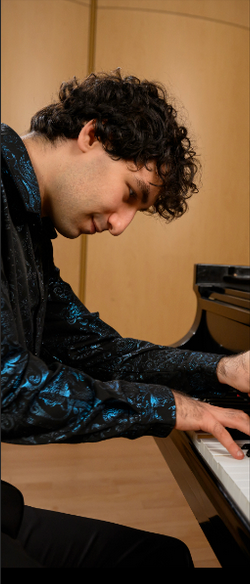
He added that he was “on cloud nine” to get to work with Ruth Reinhardt. “We had one rehearsal to put it together and she knows how to utilize the time. And in the performance there were moments where we both knew I was going to get carried away. She knew how to keep everything under control and I appreciated that so much.”
Giuseppe Guarrera said the opportunity to play with The Cleveland Orchestra was more than a dream. “The moment they started to play, the beauty, warmth and collaborative approach they showed was overwhelming. Because they are used to playing with so many great soloists, one could think, why should they be happy to play with a young unknown pianist, but yet they were extremely supportive.
“After the rehearsal they were encouraging and giving me compliments. And Ruth Reinhardt led the rehearsal perfectly — it was very impressive. I was quite afraid of this round, because I always feel a huge responsibility playing with an orchestra. Yesterday, what really made me a little calmer was to think of myself not so much as a soloist with an orchestra, but as part of the whole thing.”
Evern Ozel, who chose Beethoven’s 4th concerto, recalled playing the piece with The Cleveland Orchestra in 2016 as a finalist in the Cooper Competition. “That’s one of the highlights of my music career. It was such an amazing experience. The Cleveland Orchestra is the best in the world and they have the sensitivity that it takes to play this piece. And I’m not the same player I was back then, so the opportunity to play it again with them was incredible.”
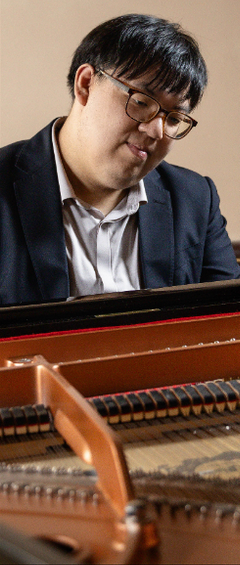
Asked if had anything to add to the comments of his colleagues, Lando probably spoke for all four when he said, “Overall, this entire competition has been fantastic and an absolute joy. I walked in knowing I was going to have a great time but I didn’t know how much of a great time.”
Published on ClevelandClassical.com August 20, 2024.
Click here for a printable copy of this article


